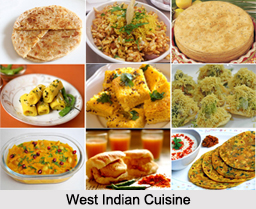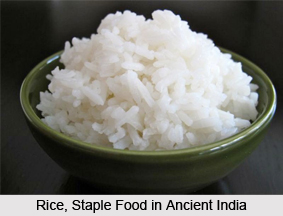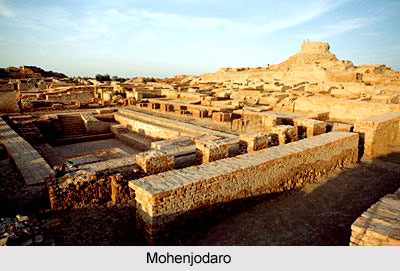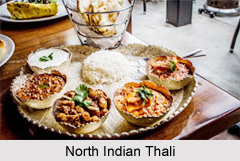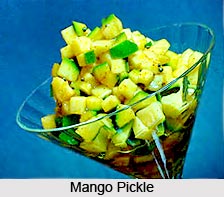 Pickles are fundamental in Indian cuisine for awakening the appetite and can range in flavor, textures, and ingredients. Pickles are exotic in taste. No Indian meal would be complete without them. A pickle is a fresh salted relish from the cuisine of India. It is usually eaten in small amounts to add flavor to a meal. The art of making pickles dates back hundreds of years. In India, there are many varieties of pickles. India is famous for its pickles. Lets plunge into the world of Indian pickles.
Pickles are fundamental in Indian cuisine for awakening the appetite and can range in flavor, textures, and ingredients. Pickles are exotic in taste. No Indian meal would be complete without them. A pickle is a fresh salted relish from the cuisine of India. It is usually eaten in small amounts to add flavor to a meal. The art of making pickles dates back hundreds of years. In India, there are many varieties of pickles. India is famous for its pickles. Lets plunge into the world of Indian pickles.
1. Mangalorean Kochala Lonche (Chopped Mango Pickle):
Ingredients
•1 kg large raw mangoes
•1 cup table salt
•1/2 cup chilli powder
•1 1/4 tsp turmeric powder
•6 tsp mustard
•1 tsp fenugreek
•3/4 tsp asafoetida powder
•1/4 cup peanut oil (optional)
Methods
1. Skin and cut mangoes into bit as tiny as possible. This mince is called kochalu (kochor).
2. Add salt and keep aside.
3. Roast the mustard without oil till it starts to splutter. Cool.
4. Roast fenugreek till light brown.
5. Roast chilli powder till thoroughly dried.
6. Heat oil, add asafoetida powder and remove from fire.
7. Stir in turmeric powder.
8. Finely mix the ingredients well with Powder mustard and fenugreek and add to the kochalu.
9. Stir well. It tastes best with rice dishes.
Goes best with: Rice dishes
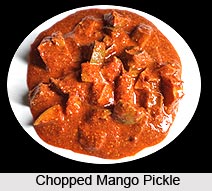 Tips:
Tips:
•The mangoes should be raw and firm.
•Don`t use too much oil. Though oil preserves pickles well, it`s a myth that more oil means more taste.
•Store pickle in porcelain jars.
2. Maharashtrian Kairi Che Lonche(Raw Mango Pickle):
Ingredients:
5-6 raw mangoes
1 tbsp asafoetida
½ cup refined oil
3 tbsp salt
½ cup pickle mustard powder (available at grocery stores at Dadar & Lalbaug)
½ cup red chilli powder grinded with 10-12 flakes of garlic
½ cup mustard seeds
1 tbsp turmeric powder
3 tbsp fenugreek seeds
3 tbsp mace
coarsely powdered 2-3 cinnamon & cloves
1 cup jaggery
Method:
1. Cut raw mangoes in small pieces & rub specified amount of salt and turmeric to it.
2. Leave it aside for 20 minutes.
3. Heat oil till it smokes.
4. Switch off the flame.
5. Add asafoetida, mace & powdered mix of cinnamon and clove along with red chilli & garlic paste.
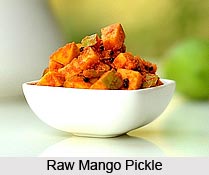 6. Gently stir.
6. Gently stir.
7. Add jaggery.
8. When the oil hits room temperature, add pickle mustard seeds, mustard powder & fenugreek seeds.
9. Make sure that the oil is not too hot when you add mustard & fenugreek seeds as the burnt taste spoils the flavour.
10. Pour the ingredient-mixed oil over raw mango marinade.
11. Mix it well with your hands for 15 minutes.
12. Transfer into a porcelain jar.
13. This pickle needs sufficient mount of oil, so if you feel the proportion of oil is less or equal to raw mangoes, add more oil.
14. Never add raw oil directly to the pickle, heat it up first & then leave to cool before pouring over raw mangoes.
Goes best with: Piping hot Varan-Bhaat.
Tips:
•Ratnagiri Alphonso is the mango type for this pickle.
•Before transferring pickle into a porcelain jar, layer it with 2/3 tbsp salt. This works as a natural preservative & prolongs the shelf life of the pickle.
3. Kerala-style Kadagu Manga (Mustard and Mango Pickle):
Ingredients:
•1 kg tiny raw mangoes
•1 heaped glass chilli powder
•1 heaped glass table salt
•1 tbsp turmeric powder
•1 tbsp mustard powder
•1 tbsp asafoetida
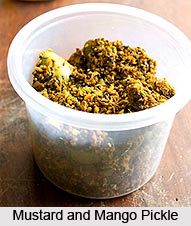 Method:
Method:
1. Wash mangoes and spread out to dry on a towel.
2. Once the water evaporates, trim stalks to about 1 cm.
3. Put mangoes into a vessel and pour salt on top.
4. Cover it with a plate of the exact circumference of the vessel.
5. Wrap with cotton cloth and secure with string.
6. For three days, (twice every day) untie vessel, takes lid off and shake vessel a couple of times to help salt permeate.
7. Make it a point not to touch mangoes.
8. Let it marinate for three days or till mangoes shrivel up.
9. Blend remaining ingredients in a mixer, along with salt water drained from the vessel.
10. Immediately, pour the concoction over mangoes in a barni (porcelain jar) or glass bottle.
11. Avoid using a steel container. Let it stand for about 15 days.
Goes best with: Curd rice, or any other bland preparation.
Tips:
•Buy firm mangoes that are sour in taste.
•Kashmiri chilli powder gives you pickle thats deep red and not-too-spicy; the opposite applies to its regular counterpart.
•Always switch the fan on while marinating and mixing pickle; this ensures hygiene, which increases shelf life.
